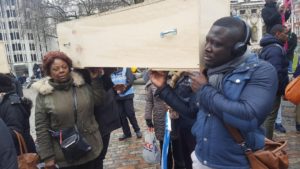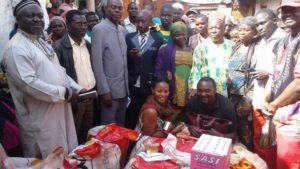Southern Cameroon Crisis: why is the International Community Silence when La Republic is committing Genocide.
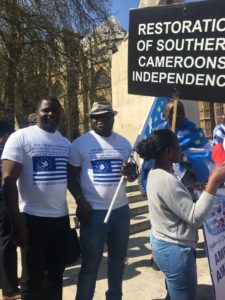
The Southern Cameroons crisis that has been playing out for close to two years has gradually spiralled out of control following the existence of many armed groups in the two English-speaking regions of the country. Over the last two months, many innocent civilians have met their death as the government pursues its policy of collective punishment. Many civilians have seen their homes burnt down by government forces which have opted for a “scorch-earth” policy that is hurting many vulnerable people who have nothing to do with the conflict.
A few weeks ago, villages such as Kembong and Kwakwa in the South West region were visited by a brigade of alcohol-inflamed and sex-starved soldiers whose actions defied all modern law enforcement logic. Houses were burnt down, with the old and vulnerable consumed by the flames in a campaign that will never bring peace to the region. What is more disturbing is that, for more than a month now, the government has not ordered any investigation into these barbaric atrocities. It has not even expressed any remorse for such acts of inhumanely committed by people who are supposed to serve and protect the population.
Of course, what caused the government to adopt the obnoxious “law of Hammurabi” was the killing of army soldiers by some unidentified gun men. This act should never be extolled, but the government’s decision to come down to the level of a ragtag army clearly calls for a global condemnation.
The government is an organized structure with institutions whose capacity to investigate crimes has been built over the years. Its actions in retaliation to acts committed by unknown gunmen serves as a testament to its failure to reign in the tough Ambazonian fighters who are determined to take the war to the enemy.
The government clearly understands that in seeking out those who commit such odious crimes against government forces, it must partner with the local population. It knows it must use the local population to gather intelligence that will help it in its efforts to restore peace and security in the region. The government’s violent reaction to crimes committed by a few gunmen speaks volumes to its inability to keep the country safe through meaningful dialogue. For long, it has been giving the impression that it cherishes dialogue, but its actions over the last six months have proven that it has been paying lip service to the whole notion of dialogue.
Kwakwa had been considered as a flash in the pan by many government apologists and many people hoped that this unfortunate drama would not repeat itself. But three weeks ago, Mbim, a small village some 20 kilometres from Kumbo, was the target of these alcohol-inflamed soldiers. During the military onslaught, many houses were razed, food was destroyed, and many civilians were wounded, an act that has been condemned by many Southern Cameroonian activists and opinion leaders.
From every indication, this seems to be the government’s modus operandi and it is determined to use it. The government seems to have sworn that theirs will be the kingdom of tears and homelessness for as long as they continue to challenge its authority. The same destruction has been spreading to other parts of Southern Cameroons.
The government that is supposed to protect civilians has resorted to killing them just because some of them do sympathize with Ambazonian Defense Forces. The civilians have been caught between the devil and the deep blue sea. They have no control over the Ambazonian fighters who consider themselves as freedom fighters and the beleaguered government seems to be at its wit’s end as it faces tough challenges from the determined freedom fighters.
On Tuesday, April 3, 2018, the Cameroonian military attacked and burned several homes in Mungo Ndor, a small village located some 40 km from Nguti in the Koupé-Manengouba Division in the South West region. The senseless arson campaign by government troops has left many people in tears. Ms. Egbe Maria Ndonge, popularly known as “Mami Maria”, was burned to death in her house, while asleep. Many people question the rationale behind such government brutality that will make it hard for both parties to sit and talk.
A correspondent on ground zero, residents of the village confirmed that local churches had been burnt and 6 civilians shot. The sources also added that some civilians had been killed in the senseless government attacks. It should be recalled that killing civilians on purpose and destroying civilian property constitute war crimes. The government has an obligation under international law to investigate all the atrocities being committed by its military. So far, the Yaoundé regime seems to be enjoying as Southern Cameroonians run into the jungle for accommodation the case Petty can’t b over emphasized just 15 years old and was shot in the face now fighting for her life.
https://twitter.com/KindongMilton/status/987194324801777664/photo/1
According to the correspondent, the village has been besieged by the army, and the villagers are not allowed to move in or out. Hundreds of residents are currently seeking refuge in the forest. Many rights groups, including the one led by Barrister Felix Nkongho Agbor-Balla, are calling on the government to grant journalists and human rights organizations access to these regions.
Since the conflict in Southern Cameroons started in October 2016, more than 1,000 people have been killed, with army soldiers accounting for more than 300 of the deaths. The civilian population has borne the brunt of the government’s attacks on villages and towns in Southern Cameroons.
https://twitter.com/KindongMilton/status/985967702421499907
The Southern Cameroons crisis has resulted in the fleeing of more than 60,000 Southern Cameroonians from their homeland to Nigeria due to the government’s military violence. Many of these people are innocent civilians who have been caught between government army soldiers and Ambazonian Defense forces who are battling for the control of territory in Southern Cameroons; a region rich in minerals, especially oil, gold and diamond.
The tension in the region has been flaring following the arrest of Ambazonian leaders in Nigeria in early January and their illegal extradition to Cameroon where they are being held incommunicado at the Gendarmerie headquarters in Yaounde.
Following the arrest of the Ambazonian president and 46 others, violent clashes erupted in several towns in Southern Cameroons. In Batibo, three army soldiers were killed by unknown gunmen, while the Batibo Senior Divisional Officer was taken by the gunmen to an unknown destination. His whereabouts are still unknown. The Batibo Assistant Mayor, Esther Tebo, for her part, escaped capture by the skin of her teeth, after gunmen showed up at her church and opened fire, wounding several people.
Kembong, a town in Manyu Division which was a hotspot during the violent confrontations in December 2017, was back in the spotlight following an attack by heavily armed gunmen on the temporary military barracks in the town. The attack resulted in the killing of three gendarmes, with many other uniformed officers wounded. The wounded were flown to the Mamfe military hospital for treatment, a measure that helped to stabilize them.
The incident, which is a response to the government’s military action in many parts of Southern Cameroons, came less than 24 hours after the country’s president, Paul Biya, said the North West and South West regions were stabilizing during a speech delivered to the country’s youth on Saturday, February 10, 2018, on the occasion of the country’s youth day.
There have been many cases of violence in the English-speaking regions following Mr. Ayuk Tabe’s arrest. Cameroonian authorities themselves have become more concerned about the political and military conflict in the country as it continues to spill out of the control. Rumors making the rounds for some time now hold that young Francophone fighters are swelling the ranks of Southern Cameroonian fighters in Ndian Division.
This is making things a lot more dangerous, as an issue that started with socio-professional demands by lawyers and teachers may end up becoming a major civil war in a region that has had more than its fair share of civil wars and political chaos.
But the most challenging thing is the silence of the international community. Despite the daily killings taking place in many towns in Southern Cameroons, the international community has sunk into a deafening silence that is worrying to many people across the globe.
Some analysts argue that the international community has entered into a pact with the Cameroon government. The international community has been looking the other way while the Cameroon government is mowing down its own people. Despite calls to the global body by rights groups such as the International Crisis Group and Amnesty International for a direct intervention, the UN has continued to display a form of indifference that is more unsettling than reassuring.
Even the illegal arrest and extradition of Southern Cameroonian leaders did not shock the international community. The United Nations, in particular, seems to be playing ball with the Cameroon government and this is causing many people to hold that most of the military violence taking place in the English-speaking regions of the country has received the blessing of a United Nations that is more interested in keeping the country together than in the methods that are being used to keep the country one and indivisible.
So far, the international community has been turning a blind eye to the death and destruction that army soldiers have been spreading in the two English-speaking regions of the country. Is the international community under the influence of France that has been the greatest beneficiary of the Southern Cameroonian wealth or is it just sick and tired of dealing with conflicts on the continent?
From the behavior so far displayed by the international community, it is clear that Southern Cameroonian lives do not really matter. Many Southern Cameroonians have been sent to an early grave as a result of the government’s ill-advised decision to pursue military instead of a political approach to the conflict. Could the Biya regime have been successful in corrupting the entire international community? Why would a people who simply want the world to know that they are hurting become a target of a government that is supposed to protect them?
The international community might have called for inclusive dialogue at different stages of the conflict, but its passivity and lack of interest in the whole situation speaks to the connivance between it and the Biya region to decimate the indigenous people of Southern Cameroons. If the international community does not come out of the “Omerta” it has imposed on itself, Southern Cameroonians will continue to consider it as an accomplice in the genocide that is currently playing out in their country.
https://guardian.ng/saturday-magazine/cover/help-genocide-ongoing-in-southern-cameroon-says-wara/
It is time for the international community to get tough on a government that is considered by its own citizens as a crime syndicate. Its corruption has robbed its own people of happiness and prosperity. Today, it is fiercely promoting the principle of political tribalism as a means of sustaining itself in power. The market-dominant minority that has enriched itself through unorthodox means has brought untold hardship to Cameroonians. It has to go and Cameroonians in general hold that the intervention of the international community will be a welcome relief. Turning a blind eye to the problem will not make it go away. The international community must step in to restore peace in a country that is anything but democratic.
There’s need for the international community to stop the genocide and initiate a peaceful dialogue to determine the terms of separation between La Republique du Cameroon and Southern Cameroons Ambazonia.
Ambazonia MUST be FREE
Kindong Milton, SCNC Activist UK.
LET MY PEOPLE GO (WE WILL RESIST)
LET MY PEOPLE GO (WE WILL RESIST)
About the author
Catherine Muring Yombo is an active member of the Southern Cameroon National council (SCNC UK). At the moment an asylum seeker in the UK with no home, country, state to return to. I am a prisoner and refugee in my own home land Southern Cameroons, just a matter of time. I will continue to fight and speak out to the world until our independence is granted. La Republic du Cameroun (LR) can claim ownership of our lands and people but one thing is certain that there will always be a one day chance for the true owner over the 99days of a thief. I shall die for my land and nobody or anything will stop me from fighting till the end. Many of our people have been killed, arrested, tortured, abducted etc. by LR government but there is no turning back if not for me for future generation. The fight for total restoration of southern Cameroons (SC) continues for it is our fundamental right by birth.
History Told and will always be Told
SCNC as a pressure group is fighting for the liberation of southern Cameroons which this has continuously suffered attack from the French Cameroon gendarmes. This is carried out through peaceful means while the French Cameroon has turned this into a war fair denying Southern Cameroonians of their basic human rights. Such barbaric motives have resulted to thousands of innocent southern Cameroonians to either lose their freedom or lives. Right now our people are scattered all over in the jungle, those unable to run being molested and under all forms of abuses. Fear hovers all over towns and cities as the streets are flooded with uniform men with weapons ready for the next victim. In addition to all these ruthless acts of barbarism, people’s valuable goods are seized and others burnt or destroyed. All we want now is complete independence and there is no room for any form of union and we also say no to a federal government for this led us from ‘‘cold to frost’’. Our lands remain underdeveloped and crippled meanwhile LR extracts all its natural resources to develop its cities. This can be justified by the following (home-truth practical questions by Shey A.);
1) Why has there never been a southern Cameroonian as Director of SONARA?
2) Why was the West Cameroon Marketing Board closed down?
3) Why was the Cameroon Bank Closed down?
4) Why was the Yoke Electricity power Station closed down?
5) Why was the Santa Coffee Estate Destroyed?
6) Why is money being transported from Bamenda to Bafoussam at the close of every business day?
7) Why is money being transported from Victoria to Douala at the close of every business day?
8) Why does SONARA pay royalties to the Douala city council rather than to the Victoria city council?
9) Why do some employees of some companies in Bamenda have to travel to Bafoussam every month for their pay?
10) Why was the Victoria Deep Sea Port abandoned?
11) Why is revenue from The Southern Cameroons being used to recoup the Douala sea port when there is an excellent deep sea port in Victoria ready for use?
12) Why is there a new sea port being promoted in Kribi and not in Victoria?
13) Why was the Tiko International Airport closed down?
14) Why was the Bali Airport closed down?
15) Why was the Bamenda Airport closed down?
16) Why is there no road linking the Southern Cameroons internally between Buea and Bamenda?
17) Why is there no road linking Mamfe and Kumba?
18) Why did they link Mamfe and Bamenda?
19) Why does the ring road exist only on paper?
20) Who currently owns Ndu Tea, and Why?
21) Who currently owns Tole Tea, and why?
22) What percentage of the revenue of The Cameroons comes from The Southern Cameroons?
23) What percentage of the revenue in #22 is used for the development of Southern Cameroons?
24) Why are all the Reservoirs of Petroleum products in Douala, Yaounde, Bafoussam and in Garoua while there is none on Southern Cameroons Soil, when production is based in Victoria?
25). Why are petroleum products in the Southern Cameroons imported from Douala, while the refinery is in Victoria of Southern Cameroons?
26). Why are petroleum products transported by tankers from Victoria Refinery to Douala for storage?
27 Why was the Southern Cameroons not given the third option in the 1960s of gaining independence without necessarily joining either Nigeria or la Republique du Cameroon?
28). Why did the United Kingdom leave the Southern Cameroons without a Military Force to defend its territory?
29).What happened to the so called Federal Republic of Cameroon?
30). Why was The Southern Cameroons split into North West and South West Provinces?
The final straw on the camel’s back to this struggle has been from 2016 when our judicial system (Common Law) was being tampered with to be replaced by the French legal system (the civil law). Our lawyers were also having the problem of having to handle cases in court being presided over by French judges. To make matters worse, our educational system was also a victim whereby French teachers were posted to English schools. What a gross abuse of human nature. Both teachers and lawyers decided to go on sit down strike which up till now is ongoing with no school resumption. As usually, peaceful demonstrations resulted to lawyers, teachers, pro-independence activists etc being beaten, killed,brutalised and bundled to the deadly Kondengui prison. Not to talk of the numerous youths and university students that were raped and abducted. The struggle has now taken a different turn and no Southern Cameroonian of sound mind is sleeping until that minute when our flag will be flying in Buea.

When enough is enough, the people have no choice but to go out loud for international support or better still to fight for what is theirs. We have suffered enough in the cruel hands of Paul Biya and his government of LR. There is no turning back and we will resist till the end. We have been pushed to the wall for so long and with their own eyes day in and out they see people disappear into thin air,there is bound to be an explosion or eruption. That is what 22nd September 2017 was to Southern Cameroonians headed by women/TAKEMBENG or TAKUMBENG. This same day Mr Paul Biya was presiding over his bag of lies at the UN General Assembly in New York. Southern Cameroons schools have not opened since last year and Mr Biya is that bold to talk when he has deprived us of education which is a basic human right. When women come out in their numbers in a mass protest as ‘Takumbeng” in a traditional way,it means that their “eyes have seen their ears”. This is a traditional way of expressing the severity of an offence. Women go out in numbers half naked or putting on old clothes,bright colours clothes etc. The case of Friday 22nd September 2017,women were dressed either in red,white, old clothes or half naked. Southern Cameroonians have had enough and can no longer accommodate or bare the barbarism of La Republic. Mothers/women can no longer sit and watch their children disappearing. The militarization of our towns and villages,the unlawfully killings, arrests,threats,etc has unleashed the Takumbengs for an out cry for the gods to hear as well as the international community to rescue us and intervene. So many innocent souls have been lost and enough is enough.
Takumbeng or Takembeng are a female social movement in the North West region of Southern Cameroons. It connects with traditional practices where group of women perform ostracizing rituals against individuals in their communities. Glaring examples could be seen as far back as the 1950s and 1960s towards the end of colonial control and in the early years of independent Cameroon. Since the early 1990s especially in the city of Bamenda, Takumbeng protests have taken place which was another horrible period in the history of S C. This was seen more especially during the presidential election of 1992 in which the results were fraudulent in favour of Mr Paul Biya. This resulted to several deaths, arrests, destruction of public structures.
http://www.google.co.uk/url?q=http://www.yourdictionary.com/africa&sa=U&ved=0ahUKEwj2ppD
A8MPWAhUGIsAKHV2LDeoQFggiMAg&usg=AFQjCNGB_g0uAoe4vjpwoYUQdW9PXzDg3whttps://uk.reuters.com/article/uk-cameroon-separatists-refugees/at-least-43000-cameroonian-refugees-flee-to-nigeria-local-aid-officials-idUKKBN1FE246
No schools, Internet crackdown
It is nearly 2yrs now since schools have been closed in Southern Cameroons yet Mr Biya says that everything is perfect in his country to the world. The world is now a global village as we say and we can feed our eyes with happenings a thousand or more miles from us. Thanks to social media for being such a necessary evil. Internet in SC fluctuates like the stock exchange market/exchange rates meaning that it is up to the government. It is on/off so that certain happenings are hidden from the world,of course acts of horror and abuse to mankind. Dictator Paul Biya,shame on you and your government,the blood of the innocent Southern Cameroonians killed is in your hands and will haunt you. All the pains and torture inflicted on us,mass arrests,the abduction of our people and all those lavishing in prisons has strengthened this struggle to the next level.
Where is my President,my chairman and other Leaders?
A few months ago we were jubilant, welcomed and celebrated the formation of our interim government headed by HE Sisiku AyukTabe to lead Southern Cameroons. I amongst others did not hesitate in sending out this message to the world “My president,our president is now Sisiku AyukTabe and that is final and indisputable. His mandate is genuine,legal and we (Southern Cameroonians) have chosen him as our leader. We all stand with him and he will take us out of the burning bush. Mr President we thank you for taking this office and with you together we shall succeed. Our independence is inevitable and we will resist till the end. Our struggle to independence is God-ordained and we must take back control…….” for further reading; http://scnc-uk.com/2017/11/07/president-of-southern-cameroons/
The cruel hands of LR at work once more, pure State-Sponsored-Abduction gross human rights violations. Our interim President HE Sisiku AyukTabe Julius,SCNC national chairman Nfor Ngala Nfor, members of the interim government, and many others were abducted in Nigeria. This act of barbarism took place on January 5th 2018 in Nera Hotel in Abuja-Nigeria during a meeting to discuss the situation of thousands of Southern Cameroonians refugees in Nigeria. Our leaders were picked to the land of nowhere like hens off their chicks and up till now they have been denied access from lawyers and even their love-ones. What cruelty,where is the UN, Amnesty etc? In this modern world people are being treated like animals. We say NO, No, No, We shall fight even with our last breath,our leaders must be free and we must be free too. Mr Biya,we shall continue this fight until you set us free,freedom is a fundamental human right. Here are the names of those abducted,just to name a few;
1) Sisiku AyukTabe Julius,
2) Nfor Ngala Nfor
3) DR. Fidelis Nde Che
4)Dr. Henry Kimeng
5) Prof. Awasum
6)Dr. Cornelius Kwanga,
7)Barrister Nalowa Bih
8)Tassang Wilfred,
9)Elias Eyambe,
10) Ojong Okongho
11)Dr. OGORK Ntui and
12) Shufai Blaise Berinyuy.
Where is the world,how is this possible and has happened to people seeking refuge in another country? Nigerian/Paul Biya alliance opened to the world to see the lawless nature of Africa,bribery and corruption is the game. The western world especially the UK government must intervene for we are living in this bondage because of the mess caused by them directly or indirectly as highlighted in the write up by a powerful human right activists Jackie Fearnley https://www.google.co.uk/url?sa=t&source=web&rct=j&url=https://amp.theguardian.com/world/2018/jan/07/uk-must-take-lead-on-injustice-in-cameroon&ved=0ahUKEwjA4p68_MfYAhXiCsAKHQOsAGkQyM8BCCYwAA&usg=AOvVaw085c1Sf82ndFZWCJ_JpWRz&cf=1
HE Sisiku Ayuk Tabe Julius presiding over a fundraising event in Premrose Baptist church,London (17/11/17).
HE Sisiku Ayuk Tabe Julius with Catherine Yombo in London November 2017.
The wind of change is blowing over Africa
Mr Paul Biya of La Republic du Cameroon, step down now for time is up and we say no to dictators all over the world. For over 36yrs you have been in power changing and amending the constitution as you deem it to your taste. This year 2018 you still want to stand as a presidentially candidate which we know the winner already before Election Day. People’s power will always prevail and we the Southern Cameroonians have made it clear that enough is enough and we want back our lands. The wrath of the gods is going to be so severe so it is the time of reckoning,repent and be save. That wind of change must reach Cameroon for we are rising to fall no more.
“O my home,blessed with milk and honey,land of peace and joy. The oppressors want to sweep all our God-given treasures;we are killed,abducted,arrested and tortured for no just cause. Paul Biya and his government have come to cripple us and our future generations. Land of abundance and peace where did we go wrong? We have become refugees by no choice classified stateless.
Land of abundance and peace,we are now homeless and wander in the world. Our farm tools seized by the uniform men and we are now called terrorists.We now feed from hand to mouth with no future,resorting to food banks”.
Nfor Ngala Nfor(SCNC National chairman) heading the team at the Refugee camp in Nigeria,November 2017.
“Land of abundance and peace, we have been chased to the bushes by strangers. Lost and found in another’s territory,Nigeria is not my home. Cried the beloved,I must head home for I was never born to live in another’s house. My home,my home to thee I belong and there shall I live to part no more.
Land of abundance and peace, Mr Paul Biya will not take that from us. A blessed nation with everything in abundance,loving and peaceful. Our gods will continue to watch over us and we shall fight for our freedom till the end.
Yesterday was your partner in crime dictator Yahya Jammeh of Gambia,today Robert Mugabe of Zimbabwe etc. and tomorrow will be you dictator Paul Biya of LRC. The voice of the voiceless will be heard with no doubt. Land of abundance and peace never to die”.
Plan of Action
I will die for my country, will resist till our independence granted. “When injustice becomes the law, Resistance becomes duty’’, Thomas Jefferson.
For your interest by Catherine Muring Yombo
http://scnc-uk.com/2017/08/17/ahead-ahead/
http://scnc-uk.com/2017/11/07/president-of-southern-cameroons/
http://scnc-uk.com/2017/09/23/454/
http://scnc-uk.com/2017/08/17/ahead-ahead/
scnc-uk.com/2016/12/04/this-is-the-timefreedom-is-comingfear-not-the-oppressors
http://scnc-uk.com/2017/07/15/total-restoration-of-our-statehood/
https://twitter.com/yombomuring
Done this day, April 14th 2018 by CATHERINE MURING YOMBO.
THE WAR IN AMBALAND
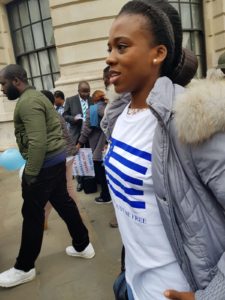
There has been an unprecedented desertion of major streets in Manyu Division of the South West Region since the declaration of war on the ‘Anglophone secessionists by Cameroon’s President, Paul Biya.
FUALEFAC FUANYI SCNC UK Activist.
President Of Southern Cameroons
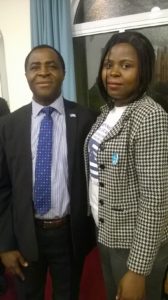
My president,our president is now Sisiku AyukTabe and that is final and indisputable. His mandate is
Innocent arrest in southern Cameroonians
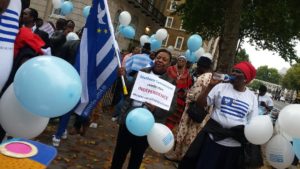
The government of la’ republic is confused and desperate to arrest anyone that catches their attention. Mr. Patrick ngangang, is a Cameroonian writer based in America, was arrested in Douala to add with many other southern Cameroonians that are locked up. Any educated or noneducated southern Cameroonians. The government of the USA is asking the la’ republic government for the release of Mr. Patrick and the la’ republic government is giving deaf ears. This is how innocent people suffer in prison for no just cause.

Land of abundance and Peace
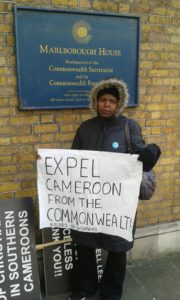
O my home,blessed with milk and honey,land of peace and joy. The oppressors want to sweep all
our God-given treasures;we are killed,abducted,arrested and tortured for no just cause. Paul Biya
and his government have come to cripple us and our future generations. Land of abundance and
peace where did we go wrong? We have become refugees by no choice classified stateless.
Land of abundance and peace,we are now homeless and wander in the world. Our farm tools seized
by the uniform men and we are now called terrorists.We now feed from hand to mouth with no
future,resorting to food banks.
Land of abundance and peace, we have been chased to the bushes by strangers. Lost and found in
another’s territory,Nigeria is not my home. Cried the beloved,I must head home for I was never born
to live in another’s house. My home,my home to thee I belong and there shall I live to part no more
.
Land of abundance and peace, Mr Paul Biya will not take that from us. A blessed nation with
everything in abundance,loving and peaceful. Our gods will continue to watch over us and we shall
fight for our freedom till the end.
Yesterday was your partner in crime dictator Yahya Jammeh of Gambia,today Robert Mugabe of
Zimbabwe etc. and tomorrow will be you dictator Paul Biya of LRC. The voice of the voiceless will be
heard with no doubt. Land of abundance and peace never to die.
CATHERINE MURING YOMBO,SCNC UK Activists
Duty to Demolish the Coloniser’s ‘Law’, Defy Colonial Officials and Resist Colonial Subjugation.
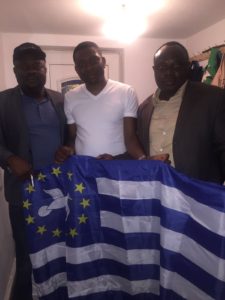
Law serves utilitarian purposes. It is consciously deployment as an instrument of social
engineering. This instrumentalist use of the law means the law is deployed to socialize,
influence, condition, and orientate individual and group behaviour. The law is also used to
channel the conduct, attitude, thinking and behaviour of individuals and groups towards
predetermined political, social, economic and cultural goals. Every legal order attempts to solve
societal problems by using the threats and promises of the law to channel behaviour in new and
different ways. It is thus to the law that a government ultimately resorts to create institutions
reflective of its image.
The political, social, cultural and economic policies of French Cameroun, including its
repressive, oppressive and colonial policies, find expression in statutes, decrees, regulations,
directives and policy statements and speeches of the Yaoundé colonial regime and its field
colonial officials. This gives French Cameroun the cover to declare the just disobedience of its
arbitrary and despotic impositions as violations of what are in effect mere pretended ‘laws’.
French Cameroun rams an array of ‘laws’ down the throats of the people of the Southern
Cameroons and exacts compliance under pain of draconian sanctions, including death by
hanging. These ‘laws’ are enforced and maintained by the colonial administrative and
repressive infrastructure instituted in the Southern Cameroons. The ‘law’ of the French
Cameroun colonial authority in the Southern Cameroons is therefore gross coercion. It seeks
to promote a colonial ideology and maintains the colonial status quo. It is basically a reflection
of French Cameroun’s colonial hegemony in the Southern Cameroons.
French Cameroun has thus presumed to declare the territory and people of the Southern
Cameroons ‘illegal’, the Southern Cameroons Broadcasting Corporation (SCBC) ‘illegal,
Radio Southern Cameroons (RSC) ‘illegal’, the Southern Cameroons Diaspora ‘illegal’, the
exercise by the people of the Southern Cameroons of their right to freedom of thought and
expression ‘illegal, their freedom to receive and share information ‘illegal’, their freedom of
2
movement ‘illegal’, and their unquestionable right to free themselves from French Cameroun
rapacious and violent colonialism ‘illegal’.
The ‘law’ declared by that country is first and foremost a means of exercising political,
economic, social and cultural power and control over the people of the Southern Cameroons.
It is the weapon of the colonial authorities in ensuring colonial dependency. It is a weapon that
fosters spoliation, pauperisation, a ghetto environment, and underdevelopment in the Southern
Cameroons. Its role is to conserve and perpetuate French Cameroun hegemony in, and
colonisation of, the Southern Cameroons. French Cameroun makes these laws in its
unflattering image. It shapes them. It defines them. It interprets them. It gives them meaning
consistent with its French-derived distorted world-view and its colonial project in the Southern
Cameroons. It is the ruling material force in the Southern Cameroons. It monopolises the means
of material production in the Southern Cameroons. It daily seeks to control the means of mental
production as well.
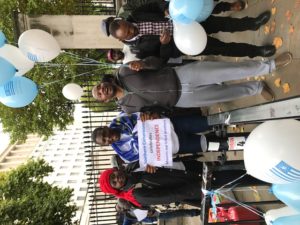

French Cameroun is undeniably the colonial authority in the Southern Cameroons,
exercising, vi et armis, a colonial sovereignty. It continues to do so in defiance of the universal
proscription of colonialism. It continues to do so in violation of the unquestionable right of the
people of the Southern Cameroons to self-determination and to freedom from alien domination.
The right to self-determination is an inalienable and continuing right under international law.
It is a pre-condition to the full enjoyment of political, civil, cultural, economic and social rights.
The 1960 United Nations binding Declaration on the Granting of Independence to Colonial
Countries and Peoples declares that “the subjection of peoples to alien subjugation, domination
and exploitation” amounts to a denial of human rights and to a violation of the Charter of the
United Nations. The Southern Cameroons situation calls for decolonisation of the territory from
the predatory colonial occupation of French Cameroun. Decolonisation will ipso facto put an
end to other gross human rights violations by French Cameroun in the territory of the Southern
Cameroons.
In such an inauspicious environment, it becomes the abiding right and duty of the
colonised people of the Southern Cameroons to destroy, and end forever, that colonial
condition. Part of that creative deconstruction of the colonial condition and narrative is the
demolition of the coloniser’s ‘law’ and legal infrastructure. It follows that a colonised people
necessarily have a right of resistance. Every colonised or oppressed people struggling against
colonial subjugation must necessarily defy the institutions and ‘laws’ of the colonising state.
3
This includes openly defying and disobeying the colonial administrators and the colonial forces
of occupation. It further includes dismantling all colonial structures in the colonised and defiled
territory, fumigating and sanitizing the entire territory to render it clean and healthy once again.
The holy duty of any colonised people is to vigorously challenge and destroy the colonial order
imposed on them. For, colonialism is iniquitous. It is tyrannical. It is intolerable. It has
universally been proscribed. Every colonised people therefore have a plain obligation in law
and in nature to resist to the end and by every available means, to disobey and demolish, the
vile colonial order to which they are subjected.
By the Assistant secretary general SCNC UK,
PRIDE MBI AGBOR
Ahead Ahead

Ahead, ahead and never to give up for the battle is not over yet. The servant will no longer wait to pick up crumbs from the master’s table. Southern Cameroonians will not sit and watch you continue to degrade us to slaves in our motherland. For 56 years we have been deprived of our basic human rights and the time has come now that we say enough is enough. The killing of innocent people, brutality, destruction of our lands and all forms of abuses will not make us give up. On the contrary, our freedom fighting spirits are very much alive and active for the day of jubilation is near.
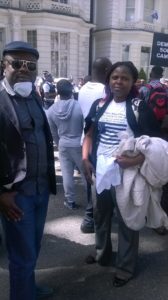
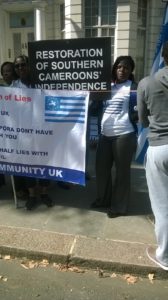
Mr. Paul Biya, in fact, you are losing the plot, our people have been killed, unlawfully arrested and detained, our children not going to School for nearly a year now and yet nothing has been done.Our plight ignored and giving a deaf-ear to all the injustices as well as inequalities. But yet you go again wasting money sending a delegation of your croaks abroad to do your dirty jobs in the name of coming over to dialogue with the diaspora, what a shame. Scheming again, as usual, to give an impression to the world that ‘Cameroon is one and indivisible or better still that you are a peacemaker. This is meant to give a good impression to the international community and we will not let you fool the world that you are a democratic leader. We the Southern Cameroonians of UK and the whole diaspora did send a powerful message to you on Sunday 13th August 2017 at Holland Park (Cameroon high commission/Embassy). We must possess our possessions so no amount of your tricks will work.
No wonder a meeting was scheduled on a Sunday at the high commission with the hope that we will not attend but since we know you so well we planned 10 times ahead giving you no space to fake a story,
As you return to the La Republic, tell your master Biya that in the UK you were all so shocked to see the British humble police officers protecting the public as opposed to yours that brutalized people, rape women and unlawfully arrest them. Also, tell him that we will not compromise our struggle to anything and will not give up until we take back control.
Ahead not to turn back for “forward ever backward never”. We shall continue to fight until our independence is granted, Lord helps us.
CATHERINE MURING YOMBO ACTIVIST SCNC UK
THE BIRHT OF A NATION (AMBAZONIA)
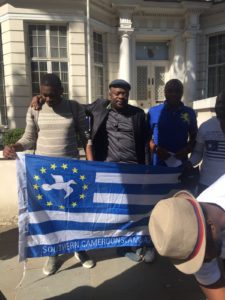
After the defeat of the Germans during World War 1, Southern Cameroon was administered by the British administrative traditions, educational and legal system (mainly the Common Law), system of government and management of the local community – which were all done and government by the British by indirect rule.
This therefore goes without saying that the main language of administration, governance and instruction in these parts is English and rightly so – likewise as French traditions and administrative system dominate the French speaking part of Cameroon.
Therefore, judging from the above brief assessment of the way both Cameroons were been administered and governed traditionally, any form of social and economic unrest in an area where English is the main language suggests that there is an issue and only fair to conclude that it is an Anglophone problem within its own right – based on its roots and heritage! This however does not equally imply that, Anglophones have a problem because they are Anglophones but solely because the people feel abandoned, segregated, marginalised, ignored and been treated for long as “second class citizens” – for lack of a better expression! Some of the reasons for this Anglophone problem have been discussed below:
- Official name of the country
One of the most frustrating issues of the Anglophone problem is found in the official name of Cameroon. The name of this country: La République du Cameroun as subtle as it might seem is a potential source of the destruction of the country in its current state of affairs.
Going back to the beginning, it is worth-noting that prior to the British and French administration of the Cameroons in 1961, the part that was governed by the French was called La République du Cameroun. But when both parts came together and were united as one, the country was called the Federal Republic of Cameroon. Note the use of the word ‘Federal’ – as this denotes the recognition that at least two political entities had decided to federate.
Three years later, i.e. 1972, the name of the country was now changed to the United Republic of Cameroon albeit against the spirit of the Foumban accords that led to the 1961 federation, however, the term UNITED still was a reminder that there was more than one political structures, identities or entities were not in unity.
This now brings us to the current issue as the name of the country is La République du Cameroun – which clearly highlights if not project the fact that there is no remnant or reminder of Cameroon comprised of two political entities that came together. This is also the exact name of French Cameroon before the federation. I guess the question now remains: what became of the English speaking Cameroon or the Anglophones? Are we no longer part and parcel of this so called “marriage”?
It is for this reason that some Anglophones feel that they have been suppressed, occupied or simply erased from the country entirely.
- The language of the law
Another deliberate projection of institutional aberration from the spirit of the 1961 union is that the French mannerisms, language and culture significantly buttress the conception of laws in Cameroon. Inasmuch as the constitution evidently stipulates that Cameroon is a bilingual country, never in the history of Cameroon has a law been presented to the National Assembly in English first. In cases where laws are proposed in both English and French versions, the English version is a translation and as in the case of the revised Penal code tabled in 2016 – the legal implications and quality of the English version is a clear indication of the level of competence (or lack thereof) of the translator.
The undergirding problem here is that if laws are systematically conceived in French, it goes without saying that its application, interpretation and implementation will based on the traditions inherited from the French with no regard for the English traditions and culture. I guess the next question now is this: how is this legal system fair towards the Anglophones especially when the cultures and interpretation of the law is already biased from the unset!
- Administrative
This is the one that is really painful and embarrassing to say the least and makes the heart of every educated Anglophone to have their hearts sinking. A country with over 30 Ministries has the inscription of the various names of the ministries in French first, then followed by English underneath mostly with smaller characters, as if was an irrelevant footnote. These are some of the trivial issues that most people might not notice unless they are Anglophones or an activist of equality and human rights.
That notwithstanding, even the websites of the over 30 Ministries are in French and in most cases, the English version is either not updated, not available or Google translated. Information, when made available to Anglophones is therefore not news or is in such poor and inappropriate English that is tantamount to an insult as if there are no educated Anglophones who would have done a better job.
The final example is Cameroon’s relations with the Commonwealth, which could and should have been noticed by members of the Commonwealth of nations. The Head of State has never deemed it necessary, important or vital to attend a Commonwealth Summit but unfailingly attends Francophonie summits which seem to be more important to him than African Union Summits. The presence of the French president at Francophonie summits and the extent of French investment in Cameroon and the diplomatic cards that may be played at these summits may be a factor in the Head of State’s decision to attend. But then, his non-attendance of Commonwealth summits begs the question of why a similar economic rapprochement is not made with countries of the commonwealth or is English Cameroonians not that important for their plights to be heard or benefits to be shared with the rest of the commonwealth member states?
- Language of communication
Firstly, inasmuch as the current (Paul Biya) and former Heads of State (Late Hon. Ahmadow Ahidjo) have made numerous speeches lasting over 50+ years, inasmuch as the current Head of State has made some small parts of a handful of speeches in English, no Cameroonian Head of State HAS EVER made a full speech in English. As a matter of fact, Anglophone Cameroonians do not know what it feels like for citizens to hear their so-called Head of State make a full speech in their first official language which could be equated with “seeing a pig fly”
Secondly, no key decisions, appointments, laws or any legal procedures or any state matter has ever been published or announced in English first; nor are Anglophones aware of any such decision for which the French version is only a translation.
There’s a major radio newscast at 3pm in English and a major radio newscast at 5pm in French. There is also a major TV newscast at 7:30pm in English and a major TV newscast at 8:30pm in French all of which are either on the CRTV radio or Television. Critically looking at it and not being biased, could the government of La Republique honestly confirm to the public that for over 50 years, all major decisions have been made between 3:30pm (after the radio news in English) and 5pm (before the radio news in French) or between 8pm (after TV news in English) and 8:30pm (before TV news in French) and thus announced in the next available newscast which happens to be in French? This would be a coincidence that has never and will never happen on planet earth. How convenient!
Another critical element is the fact that the language used on Bank Notes in Cameroon does not a single word in English printed on any of them – could there ever be a scenario in human history where the term marginalisation could be better used? This remains a problem that Francophone Cameroonians cannot complain about except by solidarity – this constitutes an Anglophone problems!
- Lack of economic development in English speaking Cameroon
Nothing of a major economic benefit to the people of West Cameroon have gained any interest from the government even when the resources are there to be developed. The Menchum fall comes to mind as an example. Research conducted has suggested that the Menchum fall, if harnessed could provide electricity to the whole of Central Africa. Any reasonable government, taking into account the frequent power failure in Cameroon would jump to this opportunity to make the lives of its citizens better and attract businesses, investments and economic growth. But because this is found in Southern Cameroon, no one cares.
- Economic headquarters of most if not all corporations and enterprises have been moved out of the area. A good example is the headquarters of the CDC from Buea to Yaounde. This is the definition of what marginalisation looks like for real
These injustices are real and they affect real people especially the Anglophones. They are so systematic that they seem obviously deliberate and ultimately criminal. It is true that Honourable WIRBA quoted Thomas Jefferson… but I want to quote Honourable WIRBA: When injustice becomes law, resistance becomes a duty”. It is the injustices above that Anglophones are RESISTING hence the cry of an Anglophone problem!
BY PRIDE MBI AGBOR ASG SCNC UK

